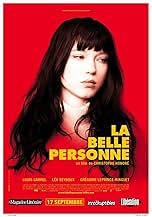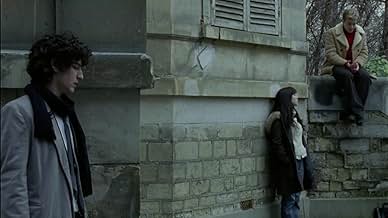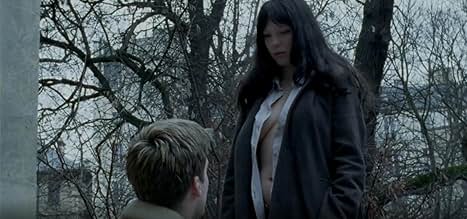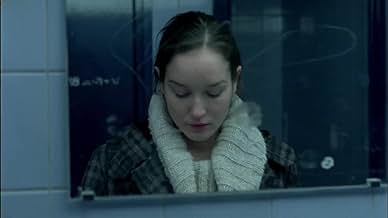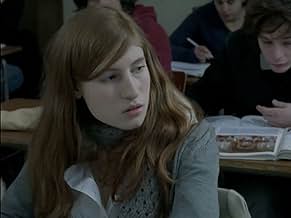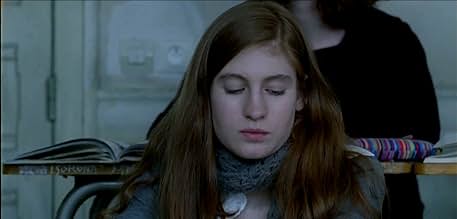IMDb RATING
6.6/10
8.4K
YOUR RATING
Cute Junie starts at her cousin Matthias' high school and class after her mom's death. She meets his friends. The boys want to date her - even her handsome, young Italian teacher.Cute Junie starts at her cousin Matthias' high school and class after her mom's death. She meets his friends. The boys want to date her - even her handsome, young Italian teacher.Cute Junie starts at her cousin Matthias' high school and class after her mom's death. She meets his friends. The boys want to date her - even her handsome, young Italian teacher.
- Director
- Writers
- Stars
- Awards
- 2 wins & 4 nominations total
- Director
- Writers
- All cast & crew
- Production, box office & more at IMDbPro
Featured reviews
I honestly thought I was watching a film from the 60s until I looked it up on IMDb. Everything rung of the 60s from the washed-out color palette (lots of white, grey and cold bluish tints) to the inexplicably brooding, emotionally muted female protagonist who falls into a love tangle (as in Buñuel's "Belle du Jour" (1967) or Vadim's "Le repos du guerrier" (1962)) to the very 60s French soundtrack (Nick Drake, Alain Barrière, Callas) to the big hairstyles on men. And of course there are heavy themes of love & sexuality, common to those classic French films that defined the genre "60s French film". Imagine my surprise when I learned that this film was made in 2008 from a novel (La Princesse de Clèves) set in 1558 in the court of King Henry II of France.
I have to admit, I didn't like this film at first. Coming from a relatively puritanical culture, it didn't sit well with me that the film was about a 30-something high school teacher trying to seduce a 16-year old student. But if you can get past that, and if you can get past the premise that each character has 2 to 3 paramours in a tangled web that would make Shakespeare resort to his slide rule, then you'll be OK. This is very much a tale of loose sexual morals, but that is precisely the intent. The question posed is: can 1 true love exist, free of all the scandalous infidelities & betrayals, or is human nature such that impetuous desires and unchecked emotions always cause sexual & emotional chaos?
You may find yourself needing to watch this film a 2nd time or, as I had to do, rewinding certain scenes to figure out exactly who is who, especially if you're watching the English subtitles. That is because the love triangles (and love rectangles and love pentagons) come at you pretty fast with no big explanations for the slow folks in the audience. But even if it doesn't sink in at first, you'll probably have a decent grasp by the end of the film if you pay close attention. While I found this to be frustrating at first, I felt ultimately satisfied that the director took this approach, not holding our hand to lead us through every plot point. Instead, like the web of love & deceit itself, the plot is intended to be challenging if not confusing.
In the 2nd half, the story distills down to the main 3 characters, and the final 30 mins pack a whollop. My only real criticism is that it seemed to drag on 10 minutes beyond the dramatic climax & revelation, thereby watering down the effect of that powerful scene. Other than that, I found this to be a masterful telling of a tale that begins slowly, convoluted & seemingly uneventful, but then it snowballs to a rich and satisfying closure.
I have to admit, I didn't like this film at first. Coming from a relatively puritanical culture, it didn't sit well with me that the film was about a 30-something high school teacher trying to seduce a 16-year old student. But if you can get past that, and if you can get past the premise that each character has 2 to 3 paramours in a tangled web that would make Shakespeare resort to his slide rule, then you'll be OK. This is very much a tale of loose sexual morals, but that is precisely the intent. The question posed is: can 1 true love exist, free of all the scandalous infidelities & betrayals, or is human nature such that impetuous desires and unchecked emotions always cause sexual & emotional chaos?
You may find yourself needing to watch this film a 2nd time or, as I had to do, rewinding certain scenes to figure out exactly who is who, especially if you're watching the English subtitles. That is because the love triangles (and love rectangles and love pentagons) come at you pretty fast with no big explanations for the slow folks in the audience. But even if it doesn't sink in at first, you'll probably have a decent grasp by the end of the film if you pay close attention. While I found this to be frustrating at first, I felt ultimately satisfied that the director took this approach, not holding our hand to lead us through every plot point. Instead, like the web of love & deceit itself, the plot is intended to be challenging if not confusing.
In the 2nd half, the story distills down to the main 3 characters, and the final 30 mins pack a whollop. My only real criticism is that it seemed to drag on 10 minutes beyond the dramatic climax & revelation, thereby watering down the effect of that powerful scene. Other than that, I found this to be a masterful telling of a tale that begins slowly, convoluted & seemingly uneventful, but then it snowballs to a rich and satisfying closure.
After her mother's death, a pretty teenage girl (Lea Seydoux) moves in with relatives and attends school with her male cousin. She quickly gets embroiled in the dizzying affairs of her cousin's clique of friends and young teachers. There are straight affairs, gay affairs, straight love triangles, gay love triangles, bisexual love triangles, teacher-student affairs, teacher-student love triangles--really you need some kind of chart to keep track of it all. "Junie", the protagonist, first gets involved with "Otto", the shy odd-man-out in all these sexual shenanigans (perhaps because he's the only one with a decent haircut), but she soon finds herself drawn to the young Italian teacher (Louis Garrel), who is already involved with another student in the clique AND a fellow teacher.
This kind of sounds like a French bedroom farce--especially a scene where one character drops a lurid love letter from his pocket and everyone thinks it belongs to the Italian teacher, leading to all kinds of misunderstandings. But this movie is actually very moody and gloomy--even tragic at one point. All these liaisons don't seem to leave anyone very happy. In that respect this kind of reminded me of Catherine Breillat film, but it also has a surprising lack of sex scenes (aside from one strange scene where Seydoux bares her breasts for her boyfriend in what looks to be a school hallway or the streets of Paris). It is also strangely anachronistic. It's a modern-day film judging from the occasional use of cell phones, but the characters still pass notes instead of text messaging. And I guess it must be perfectly legal in France for teachers to carry on with students because no one even remarks on it. (Of course, everyone here LOOKS like they're in their twenties). I guess France is just a different place--at least their movies certainly are.
Seydoux is pretty good here even if her character is frustratingly opaque. She and Anais Demoustier (who has a small part in this and would appear with Seydoux again later in a similar film called "Le Belle Epine") might be the only girls prettier than their male co-star Louis Garrel, who has appeared in seemingly every other French film since making his mark in Catherine Breillat's 2007 film "The Last Mistress". It is Seydoux though who is perhaps on the verge of true international fame with a starring role in "Farewell, My Queen" and in the upcoming Cannes-winner "Blue is the Warmest Color". This is kind of strange movie for a lot of reasons, but it's also actually pretty good.
This kind of sounds like a French bedroom farce--especially a scene where one character drops a lurid love letter from his pocket and everyone thinks it belongs to the Italian teacher, leading to all kinds of misunderstandings. But this movie is actually very moody and gloomy--even tragic at one point. All these liaisons don't seem to leave anyone very happy. In that respect this kind of reminded me of Catherine Breillat film, but it also has a surprising lack of sex scenes (aside from one strange scene where Seydoux bares her breasts for her boyfriend in what looks to be a school hallway or the streets of Paris). It is also strangely anachronistic. It's a modern-day film judging from the occasional use of cell phones, but the characters still pass notes instead of text messaging. And I guess it must be perfectly legal in France for teachers to carry on with students because no one even remarks on it. (Of course, everyone here LOOKS like they're in their twenties). I guess France is just a different place--at least their movies certainly are.
Seydoux is pretty good here even if her character is frustratingly opaque. She and Anais Demoustier (who has a small part in this and would appear with Seydoux again later in a similar film called "Le Belle Epine") might be the only girls prettier than their male co-star Louis Garrel, who has appeared in seemingly every other French film since making his mark in Catherine Breillat's 2007 film "The Last Mistress". It is Seydoux though who is perhaps on the verge of true international fame with a starring role in "Farewell, My Queen" and in the upcoming Cannes-winner "Blue is the Warmest Color". This is kind of strange movie for a lot of reasons, but it's also actually pretty good.
This is a lovely, deliberate, melancholy look into the fairy-tale lives of pale, beautiful, preternaturally graceful high-school students in Paris - a dreamy, pearly, wintry Paris on which the harsh sun never, ever shines.
The Beautiful Person is so hypnotically beautiful that it drew me through the somewhat jarring adjustment I had to make from my placid late-middle-aged American world into theirs, which teems with sex and longing, but - Oh, my! - it was worth it. This movie is luxurious and delightful.
Some of those who do not like it may be unwilling or unable to make such a cultural adjustment, but those who do will be rewarded. Earlier reviews here encouraged me to hang in there through the rough patches in the beginning, when I could not even tell who was who and doing what with whom. Those reviews also hinted that I might be slightly disappointed after Christophe Honoré's last movie, the remarkable Love Songs (Les Chansons d'amour). I was not at all. This is a sadder movie, but it is no less deeply satisfying.
Like Love Songs, seeing this once is not enough: I need my own copy so I can watch it over and over. Also like Love Songs, I expect the pleasure it gives will grow richer with each viewing.
Something nice I just realized: there are no drugs in this movie, hardly any alcohol (none at all among the kids), no vomiting, no farting, no bullying, no mindless cruelty or grossness of any kind. In other words: This is not an American movie for American teenagers. It is probably not even a realistic view of Parisian teenagers (even they must have a few pimples), but realistic or not it is a joy to behold.
The Beautiful Person is so hypnotically beautiful that it drew me through the somewhat jarring adjustment I had to make from my placid late-middle-aged American world into theirs, which teems with sex and longing, but - Oh, my! - it was worth it. This movie is luxurious and delightful.
Some of those who do not like it may be unwilling or unable to make such a cultural adjustment, but those who do will be rewarded. Earlier reviews here encouraged me to hang in there through the rough patches in the beginning, when I could not even tell who was who and doing what with whom. Those reviews also hinted that I might be slightly disappointed after Christophe Honoré's last movie, the remarkable Love Songs (Les Chansons d'amour). I was not at all. This is a sadder movie, but it is no less deeply satisfying.
Like Love Songs, seeing this once is not enough: I need my own copy so I can watch it over and over. Also like Love Songs, I expect the pleasure it gives will grow richer with each viewing.
Something nice I just realized: there are no drugs in this movie, hardly any alcohol (none at all among the kids), no vomiting, no farting, no bullying, no mindless cruelty or grossness of any kind. In other words: This is not an American movie for American teenagers. It is probably not even a realistic view of Parisian teenagers (even they must have a few pimples), but realistic or not it is a joy to behold.
This film is a hidden gem for the lovers of various French traditions: epistolary literature of 17th and 18th century, the breeze of French philosophy of love, friendship and education,, view at old traditional environment of Parisian schools mixed with contemporary teaching styles, love intrigues and tragic resolutions, etc. Without knowing its French context, its difficult to grasp the charm of this movie. Love relations are mostly temporary, no matter how intense they were. Still, in all that mess, from time to time, someone is always ready to die or to kill for it. That is the substance of French literature, art, philosophy, and its always over and over joy to observe it, in cinematic works like this. Especially with two eye-candies such as Lea Seydoux and Luis Garrel, who at the same time, happen to be good actors. Two songs played in French fit very well the movie, the other songs sung in English were actually total misfit. French film for the French culture lovers. Recommended for calm rainy afternoons.
Christopher Honoré's La belle personne is a compelling curiosity; transposing the courtly world of Madame de La Fayette's classic 17th century story, La Princess de Cleves to a modern-day French lyceé (with its own courtyard), the film is a compelling observation of "courtly" love in a postmodern world; although it would be convincing to argue La belle personne is not very modern in its presentation of present-day bourgeoise Parisian etudiants. This is a world that exists in its own hermetically-sealed bubble, free from Facebook and the internet. It's a world where 60s navel-gazing reigns supreme.
The film follows the tribulations love brings, or perhaps more realistically, the tribulations of what one perceives as 'love', even if it's unconsummated. The title alludes to 17-year-old Junie (Léa Seydoux), whose aura and presence recalls a ghostly incarnation of Godard's muse Anna Karina (Perhaps a self-conscious homage to Godard by the FEMIS-teaching Honoré?). Following the death of her mother, Junie refuses to live with her father (for unknown reasons), choosing instead to live with her cousin, Mathias, in a haute-bourgeoisie Parisian arrondisement close to the school she and Mathias attend. ' Soon enough Junie becomes the default objet d'amour for the male etudiants, namely love-sick Otto (Grégoire Leprince-Ringuet) at first.
However, she soon troubles the cad-in-school Italian teacher, Nemours (the lanky yet ever-foppish Louis Garrel) with her otherworldly presence, prompting him to quickly end two amorous entanglements with a middle-aged fellow teacher and a stubborn 16-year-old female student. However, as one would expect fron the source material, tragedy foreshadows this story but it does not detract from this near-perfect made-for-TV drama.
Every performance is realistic and natural. Special kudos to Garrel and Sedoyx for their work here. Honore follows the mis-step that was Chansons D'amour with this elegant, masterfully composed concoction; even if you could argue La belle personne seems to be an inverse reworking of Chansons. With the ensemble of regulars (Garrel, Hesme, Mastroianni, Leprine-Ringuet etc), traversing both films, La belle personne perversely feels like a sequel somehow taking place in a parallel world to Chansons. In spite of some questionable if strained directorial nods to the Nouvelle Vague (mentioning them would spoil the end), Honoré shows restraint and an uncharacteristic sense of detachment. The way he directs Seydoux is a revelation. Her ghostly presence haunts the film in every aspect and should be noted as a performance of great integrity and resolve from this promising actress. As a modern-day exploration of courtly love, La belle personne, is worth seeing numerous times to catch the many subtleties it withholds on first viewing.
The film follows the tribulations love brings, or perhaps more realistically, the tribulations of what one perceives as 'love', even if it's unconsummated. The title alludes to 17-year-old Junie (Léa Seydoux), whose aura and presence recalls a ghostly incarnation of Godard's muse Anna Karina (Perhaps a self-conscious homage to Godard by the FEMIS-teaching Honoré?). Following the death of her mother, Junie refuses to live with her father (for unknown reasons), choosing instead to live with her cousin, Mathias, in a haute-bourgeoisie Parisian arrondisement close to the school she and Mathias attend. ' Soon enough Junie becomes the default objet d'amour for the male etudiants, namely love-sick Otto (Grégoire Leprince-Ringuet) at first.
However, she soon troubles the cad-in-school Italian teacher, Nemours (the lanky yet ever-foppish Louis Garrel) with her otherworldly presence, prompting him to quickly end two amorous entanglements with a middle-aged fellow teacher and a stubborn 16-year-old female student. However, as one would expect fron the source material, tragedy foreshadows this story but it does not detract from this near-perfect made-for-TV drama.
Every performance is realistic and natural. Special kudos to Garrel and Sedoyx for their work here. Honore follows the mis-step that was Chansons D'amour with this elegant, masterfully composed concoction; even if you could argue La belle personne seems to be an inverse reworking of Chansons. With the ensemble of regulars (Garrel, Hesme, Mastroianni, Leprine-Ringuet etc), traversing both films, La belle personne perversely feels like a sequel somehow taking place in a parallel world to Chansons. In spite of some questionable if strained directorial nods to the Nouvelle Vague (mentioning them would spoil the end), Honoré shows restraint and an uncharacteristic sense of detachment. The way he directs Seydoux is a revelation. Her ghostly presence haunts the film in every aspect and should be noted as a performance of great integrity and resolve from this promising actress. As a modern-day exploration of courtly love, La belle personne, is worth seeing numerous times to catch the many subtleties it withholds on first viewing.
Did you know
- TriviaChristophe Honoré decided to make this adaptation of La Princesse de Clèves after French president Nicholas Sarkozy criticized the novel.
- ConnectionsFeatured in Clash: Olivia: Hymen (2012)
- SoundtracksWay To Blue
Written and Performed by Nick Drake
Copyright Warlock Music Ltd administered by Kobalt Music Publishing Ltd.
- How long is The Beautiful Person?Powered by Alexa
Details
- Release date
- Country of origin
- Official site
- Languages
- Also known as
- Güzel insan
- Filming locations
- Production companies
- See more company credits at IMDbPro
Box office
- Gross worldwide
- $748,217
Contribute to this page
Suggest an edit or add missing content

![Watch Bande-annonce [OV]](https://m.media-amazon.com/images/M/MV5BNjgzNWM4MTAtY2Q3ZS00MjliLTlmZTctY2M3NmM2ODUzOWRkXkEyXkFqcGdeQXRyYW5zY29kZS13b3JrZmxvdw@@._V1_QL75_UX500_CR0)


